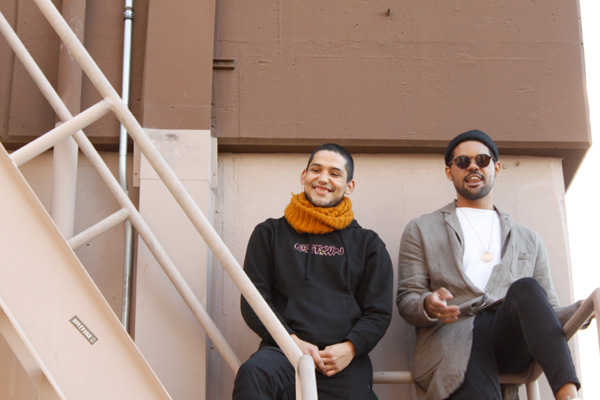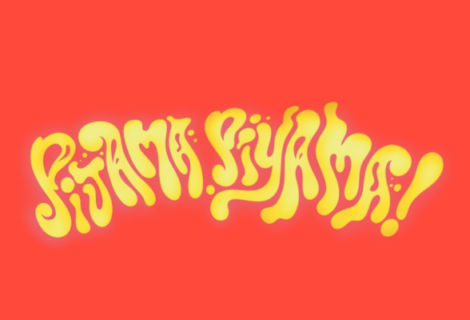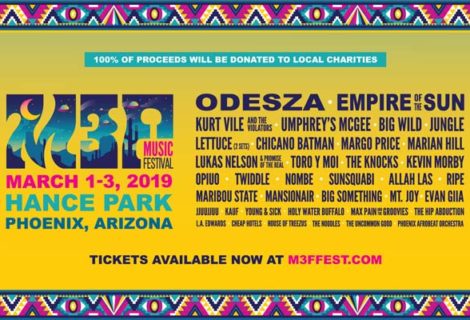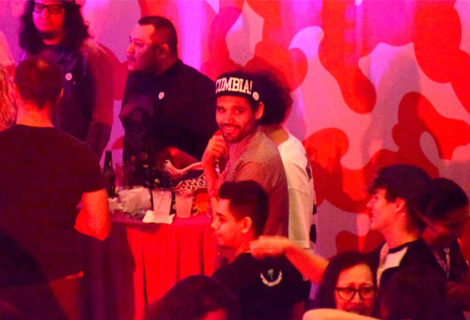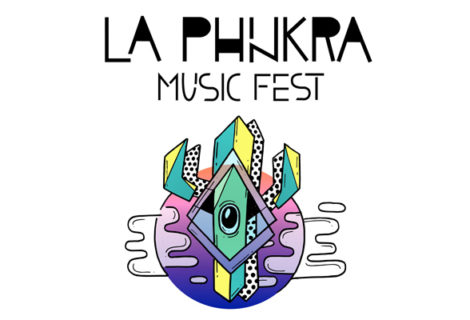Rólate Un Esplif And Enjoy The Show
We’ve never listened to Los Esplifs live and we can’t wait to check them out this Friday at Last Exit Live. However, we do know about the musicianship behind this project and the talented peeps who hone it. Most of them are serial musicians who promiscuously play in different local bands.
So we sat down with Saúl Millan and Caleb Michel, founding members of the local music scene and espliferos, to talk about their last show in La Phoenikera -at least for the meantime since they’ll be going to Mexico City to record their EP.
La Phoenikera: In a time when La Phoenikera is being saturated with cumbia bands, why did you decide to start a band playing this genre and how will you guys stand out from the rest?
Saúl Millan: I’ve been in this movement with Vox Urban and other bands from the scene for a while now, and we think that it’s not being presented in the way it should be. I feel like most bands exoticize cumbia and we’re not about that, this is about dance music, our approach is the same as a DJ: we want to make people dance.
Caleb Michel: We’re musicians and artists, but beyond that, we’re people who also want to dance, queremos gozar and we’re on stage throwing a big party and basically that’s our idea, that’s also what our name encompasses, it’s very casual, playful.
LP: Why the name? A splif means something different to different people. By splif, you mean a churro de mota and tobacco?
SM: Exactly, for a while Caleb smoked cigarettes and I only smoked weed, and basically that’s where the name came from […]
CM: We wanted a name that represented fun experiences and not to take ourselves too seriously. I mean, the music is serious in the sense that it’s based on tradition and we’re playing it in that way; we’re not hybridizing it where it’s something new, with indie-rock beats or other shit. No, this is gozadera exactly the way Discos Fuentes are and everybody loves, the only difference is that this is new music, these are our songs.
SM: One of the things that happened is that this music got genericized, because, at that time when the Fuentes records came out, it was just music, now it’s Latino music, back then it was just music played by Latino people.
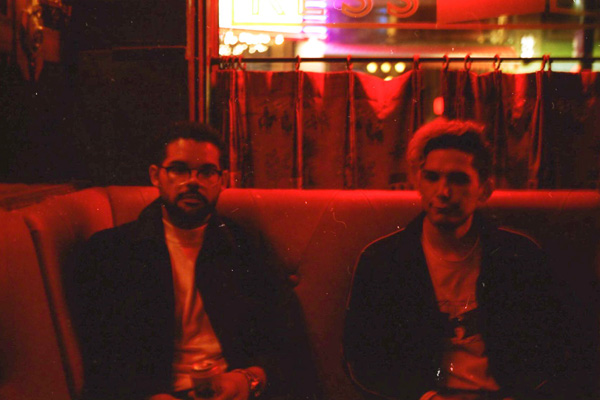
Los Esplifs aren’t about hybridizing cumbia. Photo: Adam Zanzucchi
LP: What kind of shenanigans can people expect from you on stage?
CM: Yeah, so for the last few shows we’ve done some covers, but we try to do them from a very traditional standpoint and then just putting our spin on it. I have a lot of experience with traditional cumbia because I’ve studied the alegre, llamador, tambora, the maracón, and other traditional Afro-Colombian instruments, but we don’t have those instruments […] It’s like in my eyes the idea is just to make music our grandparents played, we’re just picking any instrument we have at the house and starting a party.
SM: […] A hundred percent, because the thing that we have is different and by listening to us you’ll know it […] like we have a talented guitarist and he’s really into sound exploration, so we’re implementing the tone quality of what he’s using through pedals with traditional rhythms, that’s what creates that sense of playing the old music with what we have now.
CM: […] Tradition mezcaldo con lo que tienes y lo que sabes.
LP: There are so many factions of cumbia in South America you have cumbia villera, cumbia colombiana, technocumbia, NuCumbia, chicha cumbia, cumbiabamba, sabanera, cumbia norteña. Are you focusing on the roots of cumbia or one style specifically?
SM: For now, with the album that’s going to be recorded, it’s going to be mostly what you’d hear and what’s happening in Monterrey, which is the resurgence of old Colombian music and dubbing it to rebajado music, so that’s accordion, guitar, drums, really basic Colombian […] Discos Fuentes type of stuff. So our first album is going to sound like that […] I mean, we’re all versed and have the ability to create that, and our record will sound like traditional Colombian stuff, it will sound more like what’s coming out of Monterrey, or like some sonidero DJ or Sonidero Changa, Los Yaguarú, you know?
LP: So when’s the album dropping?
CM: That’s the big move we have coming up […] So the 25th we’re playing with Las Chollas Peligrosas at Last Exit Live and then the next day we’re flying to el DF [Mexico City] to record at a studio with some homies that hooked us up fat, so we can get it done. Because of these homies, we have in el DF and the homies that we made when Saúl was working out there a few months ago, we were able to hone the idea we had and execute it.
LP: Who is producing the album?
SM: So, the two main producers are Marco Carrillón, he did the last José Alfredo Jiménez tribute album with Camilo Lara, he also did the last MIS [Mexican Institute of Sound] album, Orquesta Mendoza […] badass motherfucker you know? He’s one of my best friends and it’s cool that he’s coming up and doing a whole bunch of shit. Also, another friend, his name is Santiago Mijares, from the Mijares family […] awesome player, he plays with Little Jesus, so we’re going to have him on board. Also, Gus Woodrow-Tomizuka, he’s a musician from Tucson, he plays with Vox [Urbana] and he has his own band called Mesquite.
LP: How will the recording process be?
SM: So we’ll be living basically at the studio for a week, it’s going to be in Jilotepec which is an hour and fifteen minutes away from the city and it’s going to be set up in this old Spanish house with a bunch of rooms.
To give you context, when we were talking about traditional, a lot of the bands recording right now sound like they haven’t been able to have the synthesis of the kind of sounds you can hear from Fuentes, from the ’60s, the quality of the microphones as well as the rooms where they were recording it, the engineering that was done to make these records sound like that […] I think the resurgence of the music is happening in that way, but the engineering part and the way of mixing the record hasn’t been done yet, and that’s kind of our interest. We want this record to sound like a lost Fuentes record that never got pressed, like a record you find at a thrift store, you put it on and it’s the most fire cumbia shit you’ve ever heard.
So with this house, we’re going to have the availability to use ten rooms and set each room to make everything sound almost exactly the same as those Discos Fuentes.
LP: So how will it work, a room per instrument?
CM: Yeah, so players will be in different rooms but will be able to hear what the other band members are playing and that level of isolation is how we can get those sounds and be able to squeeze them so when we mix, we can manipulate them and make them sound analog.
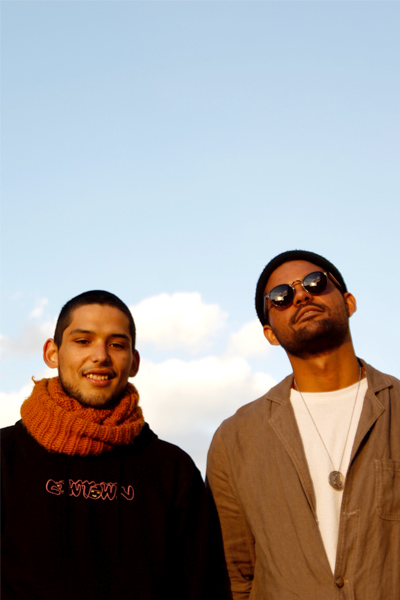
Saúl Millan & Caleb Michel, who’s the wacky and who’s the tabacky? Photo: David Saenz.
LP: Is it a full album?
CM: It’s an EP with 6 tunes.
LP: I’ve been asking local musicians if they consider that there is a Phoenix sound, do you think there’s such a thing?
SM: Absolutely, the Phoenix sound right now is what’s happening in the houses, like shoegaze, indie rock here is phenomenal, there are bands putting our really good records like, The Proteins, RØÅR, you know bands whose records sound really good, DIY kind of records. To me, that’s the Phoenix sound. Like we have members of Jerusafunk in our band, we have members of Vox which is also becoming part of the Phoenix sound, and because we’re all part of the scene in some way or another […]
CM: […] We’re all musicians who play in local bands, so we all have an input on how the sound is established.
SM: Yeah, I think it’s more about engineers making a record sound in a specific way. The sound of Phoenix is making it very niche, you hear a power record and it sounds like a great record from the ’60s. The new J-Funk album sounds like an amazing album from the ’60s and also all the Lo-Fi stuff that’s happening with the indie rock bands.
CM: It’s like yeah there is a Phoenix sound, but it’s not like any other city sounds, it’s like it’s not coming from musicians, it’s coming from the sound concept, the manipulation of what these musicians are playing, the manipulation of their actual sound. Because also, Phoenix is young as fuck, especially the music scene and other cities like New York or Chicago and even L.A. they have a sound that comes from years and years of playing musicians, like a century’s worth of musicians […] Since we’re so young the Phoenix sound is kind of adapting all these sounds from all these cities and then putting it together, the musicians play what they know, the way they like to play, and what makes us an actual sound is the engineering which other cities don’t really have.
SM: […] In other cities it’s more about musicians and how they record and the music that’s happening rather than a sound concept.
LP: Would you say Phoenix is a city of engineers/producers?
SM: I would say it’s an artist town where musicians are able to communicate a concept of how something should sound […]
CM: Yeah, I wouldn’t say it’s a producer’s town necessarily because musicians themselves are coming up with the ideas […]
SM: […] Of how the record sounds and the producers are able and willing to do that, to create that sound exactly the way musicians intend to. L.A. is a producer town, there are so many producers there that everything is going to sound high quality and everything is going to sound great and recorded amazingly. Don’t get me wrong, they produce amazing recordings, but it’s like, the sound concept and the way it should sound isn’t going to be translated. But here it seems to be the case because of all the records I hear coming out in Phoenix […] Sun Trio is a good example, it has a sound concept as a piece of art.
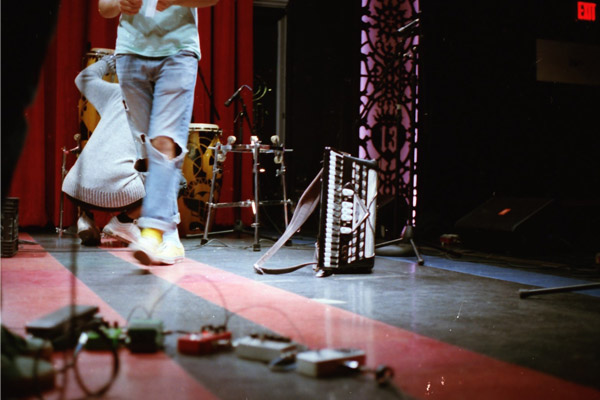
Expect to dance ’till the morning come with these cumbia espliferos. Photo: Adam Zanzucchi.
LP: What are your top five Phoenikera bands right now?
CM: Twin Ponies is for me always one of the top bands in town, they’re fire […]
SM: For me is also Los Puchos, they’re from Oracle, they’re like from a fucking ranch, an art ranch, it’s the guys from Slow Moses, another famous Phoenix band, a good example of artists creating a sound concept.
CM: The Proteins is fire. I like Nanami Ozone I think they’re fire, they’re killing the indie rock music scene, Iove watching them play live or listening to their album.
SM: The one I’m really psyched about it, is a band called Alassane. I think though there is this whole thing in Phoenix that is getting appropriated, like in terms of the Phoenix sound, because a lot of people are saying that the Phoenix sound is the Neo-soul type of shit, there’s a lot of musicians playing Neo-soul here and it’s all dope, but I don’t think it defines the sound, all their records sound conceptual though. So House of Stairs is one of them that for sure is killing it and Mesquite from Tucson is my favorite band, it’s the best band I’ve ever seen live.
LP: So for people who don’t know you guys’ backgrounds let’s talk a little bit about your projects and what you’ve done.
CM: So my dad was a musician in New York, I was born in Phoenix. When he raised me, he just raised me as a musician and because when I was young I had a natural interest just because there were congas and timbales, and bongoes, and maracas, and güiros around, so I was like ‘yes, I’m going to touch all this stuff.’ And then eventually I studied music, played contrabajo for a while and then I started gigging on timbales, drums, and percussion with Carlos Rivas and other local acts. Then I joined Jaleo and from other musicians around town, I met a few that were bomb as musicians like Marcos Credo who is a bad dude and then he hooked me up for a fat gig with Afro-Cuban All Stars and that’s the band that I travel with.
And so my dedication has always been tradition, not modern pop versions of Latino music, but the original source. Instead of pop salsa, I was listening to Fania, Johnny Pacheco and back, before that, son cubano, Arsenio Rodriguez, Buena Vista Social Club, and others. Then when I started playing with Jaleo and studied Colombian music and traditional Colombian music and all the rhythms like puya, mapalé, and porro all that stuff. I’ve always been drawn to tradition, and that’s why Los Esplifs is perfect because my job is to say, ‘this is the tradition of the rhythm we’re going to play, how can we mix it in with what we’re doing.’ So it all comes to that, I’ve learned all this tradition, now we need to apply it to what we have and the sound we want to achieve.
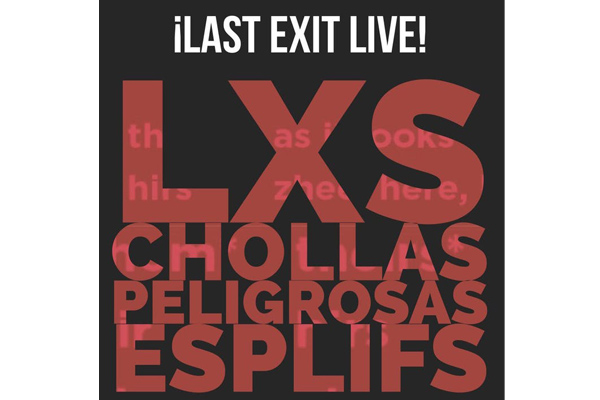
Catch Los Esplifs at Last Exit Live with Las Chollas Peligrosas!
SM: I’m from Nogales, but more importantly from a little town north of Nogales, middle of nowhere, desert shit called Rio Rico, Arizona and I used to live very far away from everything. As I grew up I started playing music with the clarinet at around 5 or 6 years old until about 9, and then I started playing trombone. I studied in Tucson at the Tucson Jazz Institute and I got to travel a bunch, win competitions and stuff […] it’s a super prestigious school, and a lot of talented people came out of that school. I graduated from there and then went to the University of Arizona and then I met Sergio Mendoza from La Orquesta and Kiki Castellanos from Vox Urbana. I met Kiki first and I was in his band playing horns and then I linked up with Sergio, so that was basically my schooling. I mean, I was going to school for music, but my schooling I got it from traveling with La Orquesta Mendoza and with Vox.
Then I got the opportunity to work with Camilo Lara and MIS so that has been my schooling. So yeah, I learned from my heroes, ’cause yeah, I was in the middle of the desert, like I remember I was 14 and I got the internet and it was fucking insane! So as soon as I got home I would go and check out all these things. I remember El Jefe came out and all this MIS shit and it was on Youtube and it was like the first person I could identify with because he was going back and sampling stuff. At the time his stuff was heavily sampled and that’s how I really got into music: hearing samples of cumbia and being like ‘wtf is that?’ Before that, I was just a hip-hop head. I would listen to it and also make beats, I was into sampling and all that. So working with Camilo and the other cats helped me develop as an artist, it was my schooling.
LP: What can people expect from this last show before you head out to record the album?
SM: They can expect the synthesis of the Phoenix sound […]
CM: I think this will be kind of the movie trailer of our upcoming album, we’re also playing with Las Chollas which is a badass band […]
SM: […] And also part of that Phoenix sound, Chollas is sick as fuck!
CM: It’s going to be awesome because Chollas are a great influence in Phoenix and Los Esplifs, which is a congregation of the musicians who play in every Phoenix band, so it’ll be a sick show.
WHEN: 1/25 @ 9:00 p.m.
WHERE: Last Exit Live 717 S. Central Ave. Phoenix, AZ 85004
HOW MUCH: $9 buckaroos at the door

